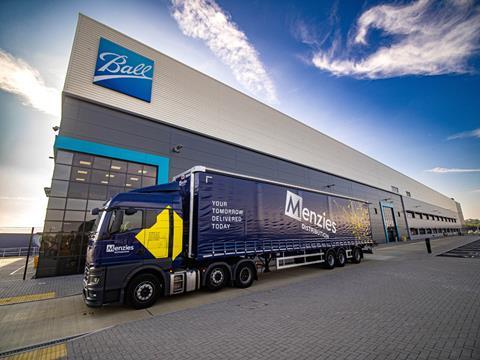
Ball Beverage Packaging and Coca-Cola Europacific Partners (CCEP) have announced a new trial in which their vehicles will be partially fueled by hydrotreated vegetable oil (HVO).
The twelve-month trial began in October, and the companies say that it could help to reduce supply chain CO2e emissions by around 300 tonnes per year. Approximately 5000 deliveries will be powered by a blend of HVO and diesel fuel which will supply the CCEP site in Wakefield, West Yorkshire, UK. The partnership is supported by Menzies Distribution, one of Ball’s UK logistics partners.
According to the companies, the benefit of using HVO is that, if fully implemented, it has the potential to save up to approximately 90% of the carbon footprint related to supply chain transportation, from production of the can to the final delivery stage to the customer.
HVO can be used as the primary fuel source for the vehicle or used in conjunction with diesel to improve CO2e emissions without requiring any change to the existing engine or additional maintenance of the vehicles.
It can be stored alongside diesel in local tanks and the fuel types can be mixed throughout the fleet. This would provide HVO on an equivalence basis and could provide a CO2e reduction through a blend of HVO and diesel.
In March 2023, Ball announced its new Climate Transition Plan, which the company says outlines its “pathway and evolution into a fully circular and decarbonized business”. Introducing HVO is seen as being one of the steps on the road to achieving Ball’s decarbonization goals.
HVO vehicles are increasingly becoming an important part of the beverage industry across Europe. They are already being used at other Ball locations in France and Sweden, and Ball is developing future HVO projects across Spain, Italy, Austria and Switzerland.
In 2022 CCEP says that it used alternative fuels in approximately 8% of the total kilometres driven by its hauliers in Europe, and is reportedly seeking to increase this. It currently uses hydrotreated vegetable oil (HVO100) in Great Britain, Germany, the Netherlands, Spain and Sweden.
CCEP is the world’s largest independent Coca-Cola bottler and has an ambition to reach net zero emissions by 2040, and reduce GHG emissions across its entire value chain by 30% by 2030 (vs. 2019). A key part of its net zero ambition is a commitment to support its suppliers to set their own science-based carbon reduction targets and to shift to 100% renewable electricity.
If you liked this article, you might also enjoy:
The L’Oréal approach to packaging sustainability
What steps is Apple taking to make its packaging more sustainable?
How did Brazil achieve its 100% aluminium can recycling rate – and can it be replicated in the EU?
Experts have their say on the EU’s Packaging and Packaging Waste Directive revisions
Also, if you’re interested in packaging sustainability, you will want to attend our Sustainable Packaging Summit in Amsterdam on 14-15 November. The Summit brings together leaders and pioneers from across the industry to align strategically, learn, network, and create a critical mass to accelerate change. You can learn more by clicking here, and you can buy a ticket to attend here.














No comments yet